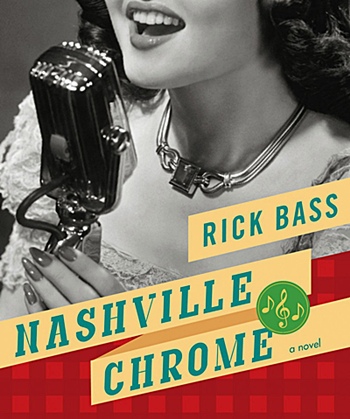..............................................
Does anyone remember the successful country singers The Brown Trio? Those of us oldies who listened to Top Of the Pops in the 1950s surely recall their song "The Three Bells/Little Jimmy Brown". I do.
The Brown Trio consisted of Maxine, Bonnie and Jim Ed Brown. The family led a precarious existence in the years following the Great Depression. Their parents alternated between running restaurants that burned down and a saw mill on the edge of the forest in Arkansas, where family members and workers lost fingers, limbs and even lives to the saw blades. The children were attuned to the hum and resonance of the blades, using their unique musical talent to assess the tone and readiness of well-tempered saw blades for cutting timber.
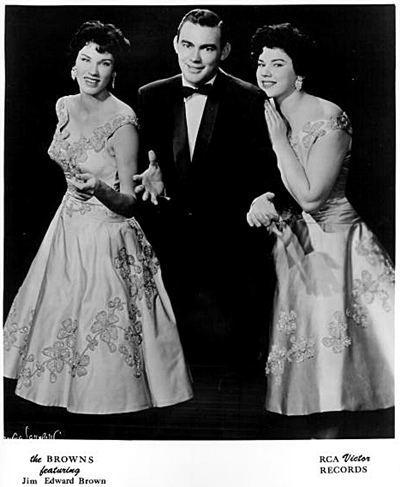 |
Nashville Chrome is about Maxine Brown, the leader of the Trio and main songwriter, and her inability to adjust to life once fame and adulation was over. Her story is also interlaced with mention of the singers of the era, including Elvis Presley, with whom younger sister Bonnie had a relationship for a while.
The book is divided into short chapters, set during Maxine’s later years, when she reminisces about the past and continually hopes to make a comeback. The chapters jump between the present and the past at different stages of her life. In the present, she has physical ailments, can’t climb the stairs, and uses a walker. For several decades after music moved on and the Trio lost its popularity, Maxine was a heavy drinker. At one point she went to New York to meet with RCA, who had already rejected her by mail. A junior employee told her "You’re yesterday’s news. We’re done with you. You’re old hat". She returned home to drink more heavily. Eventually AA helped her give up. Now she wishes to stay free of the alcohol haze in order to be ready to pick up a singing career when the opportunity occurs.
Maxine spends a lonely, circumscribed life, still driving every so often to the local grocery store Piggly Wiggly, but with diminished eyesight and driving ability. Her children rarely visit; she had put ambition first and was often away on tour while they were small, so there was no close family bonding. Her disastrous marriage to Tommy Russell had ended in divorce. The nearest thing to a friend is a neighbourhood dog, Buddy, who stops by every morning for a snack.
All is not gloom: her constant ambition to be on the "silver screen" comes true in a small way when a twelve-year old boy videos her and her story for a school project. Has it now been shown to a wider audience?
Elvis used to come and listen to their music in the Trio Club restaurant run by the Brown parents, Floyd and Birdie. Sometimes the three Brown children would tour with Elvis, wandering to clubs to play for fun and for free.
In 1956, the Brown Trio was as big as Elvis, having won every major award in country music. They were neck and neck with him in the charts. Audiences gradually changed, crossing from country music to pop and rock-and-roll. Elvis became busy touring, but dropped in to see the Browns, and Bonnie in particular, in the Trio Club. He and Bonnie went on picnics together. Elvis could get away from reporters and publicity, relax and be himself. Jim Ed’s draft into the army adversely affected the Trio’s performances, while Elvis’s entry into the army did not preclude records from being released.
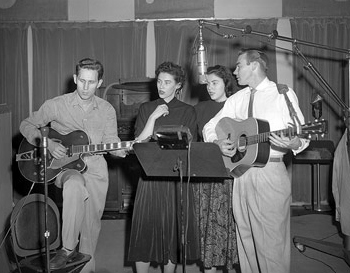 |
Musing on the annual August commemoration of Elvis’s death, Maxine considers that the Brown Trio blazed the trail and that Elvis partly owed his fame and success to them, although it wasn’t acknowledged by him. Various singers had visited the Trio Club and heard the Brown Trio sing, including Johnny Cash, Jerry Lee Lewis, Patsy Cline and Buddy Holly. The early Beatles visited the Browns to get ideas for improving their harmonies. Maxine feels that nobody knew the "real" Elvis as well as they did, and that fame had affected him for the worse.
Bass claims that in this book he was attempting to portray the emotional truths of the Brown Trio’s journey, rather than providing true-life details, precise dates and events. Fair enough. But there could be a problem of credibility if historical facts have been changed too much.
For instance, in the chapter "Borrowing the oldsmobile" (p. 150-156), the story goes that Elvis was recently back from the army and his car had broken down outside Shreveport. As he was due in Nashville the following day, he asked to borrow the Brown family’s car. Floyd and Bonnie drove in two cars to lend him Floyd’s oldsmobile. When eventually returned, the new car arrived battered, scratched and dirty, tyres with little remaining tread, having run up 30,000 miles on the odometer, and without any apology from Elvis.
The oldsmobile story was presumably included to illustrate how Elvis was drifting away and becoming corrupted by fame. But in the reference book 'Elvis Day by Day' Elvis is down as borrowing the family car in March 1955 in order to tour in Texas, well before he went into the army (unless he borrowed a car on two different occasions!) and before he was catapulted into fame.
There are some parallels between Maxine and Elvis. Both were adversely affected by fame and adulation. Both became isolated and lonely people, Maxine caught in the trap of waiting daily for a comeback due to her own psychological need for an audience, unable to accept that the Brown Trio’s music had had its day; Elvis was caught in the trap of audience expectations and the controlling influences around him. The Brown Trio managed to escape from shocking exploitation by unscrupulous manager Fabor Robinson, their treatment far worse than that meted out to Elvis by "Col." Tom Parker. At least Parker made Elvis wealthy. The Browns had to sleep in their car while touring and received very little in payment.
|
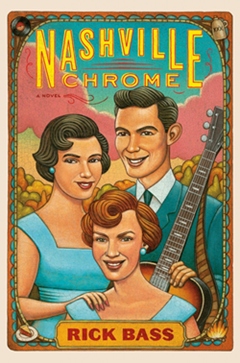 |
The book raises another issue. How can the Browns be sure that they are the only ones who ever knew the "real" Elvis, by which they mean the "young" Elvis? What about the spiritual Elvis? What about the caring, generous Elvis? What about the non-racist Elvis? Elvis was a multi-faceted, deep person. The superficial image presented to the world was never the "real" Elvis. As Elvis said himself during a 1992 press interview, "The image is one thing and the human being is another. It's very hard to live up to an image, put it that way".
Another quote by Elvis: "To judge a man by his weakest link or deed is like judging the power of the ocean by one wave" (handwritten message on Elvis's King James Bible).
Nashville Chrome is well written grammatically and stylistically, easy to read and holds the reader’s interest. Maxine’s character is portrayed empathetically, even though her failure to come to terms with her situation could become a little irritating.
Overall Verdict: Nashville Chrome is well worth reading particularly for fans who know little of the connection between the group and the young Elvis. For readers who want to know more about the group, some of the their songs are up on Youtube. They are old enough now to be vintage and interesting again. They have an important place in the history of country music.
Review by Susan MacDougall.
-Copyright EIN May 2015 - DO NOT COPY -
EIN Website content © Copyright the Elvis Information Network.
|
Please click HERE to check out The Browns performing on The Grand Ole Opry via YouTube
|
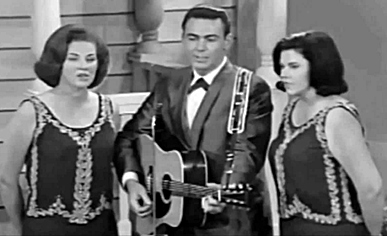 |
Elvis Presley, Elvis and Graceland are trademarks of Elvis Presley Enterprises.
The Elvis Information Network has been running since 1986 and is an EPE officially recognised Elvis fan club.




